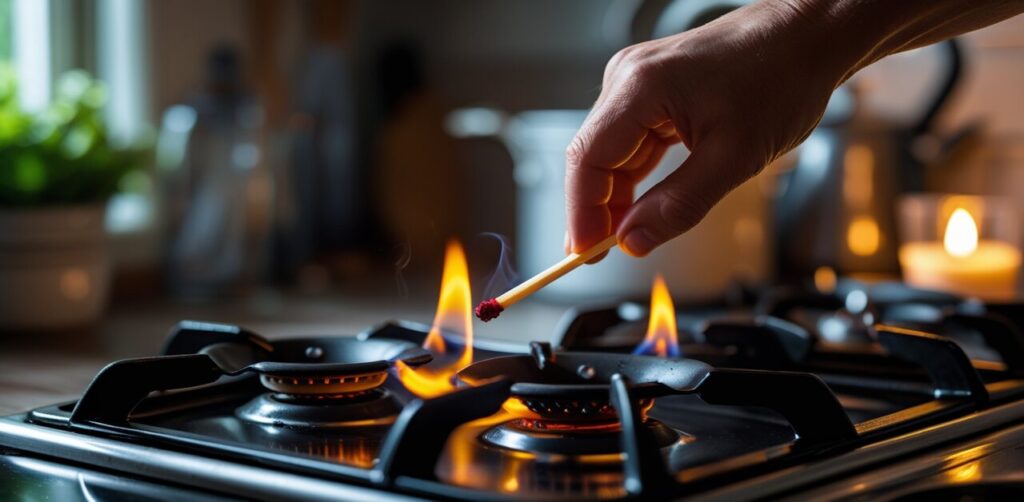A power outage can throw a wrench into your day, but for many homeowners, one question comes to mind during these moments: “Will my gas stove work without electricity?” This concern takes on even greater importance if you’re an off-grid enthusiast, preparing meals for a large family, or simply wondering how to stay prepared during an emergency.
The good news? Your gas stove might still work, even when the lights go out. But it’s not always that simple. This guide will explain how gas stoves function, how they can (and sometimes cannot) operate without electricity, and what safety considerations you should keep in mind.
Understanding Gas Stoves
Before answering whether your gas stove will work without electricity, it’s helpful to understand how gas stoves function compared to their electric counterparts.
How Do Gas Stoves Work?
Gas stoves rely on a combination of gas (often propane or natural gas) and electricity to function. The gas flows through valves and ignites when exposed to a spark or flame. Modern gas stoves typically have an electric ignition system, which creates the necessary spark when you turn the burner knob. Additionally, many stoves feature an electric oven, lighting, and fans for ventilation.
Gas Stoves vs. Electric Stoves
While gas stoves use gas as their primary cooking fuel, electric stoves rely solely on electricity to generate heat. This makes gas stoves more versatile in certain situations, as they don’t need electricity for their primary energy source. However, the reliance on electric components like ignitors means they aren’t entirely power-outage-proof.
Additionally, electric stoves are typically slower to heat compared to gas stoves but offer more precise temperature control for baking or simmering.
Will Your Gas Stove Work Without Electricity?
The Short Answer
Yes, many gas stoves can still function during a power outage, but there are some caveats and limitations you need to consider.
1. Manual Ignition Is Key: While modern gas stoves use electric ignition for convenience, you can manually ignite most stoves with a match or lighter when the power is out. Simply turn the burner knob to release gas and carefully hold a lit match or lighter near the burner to ignite it.
2. Electric Ovens Won’t Work: Even if the stovetop can be manually ignited, ovens in modern gas ranges typically rely on electricity to operate, so you won’t be able to bake while the power is out.
3. Built-in Safety Features: Some modern gas stoves are equipped with safety mechanisms that prevent the flow of gas without electricity. This means you won’t be able to manually ignite the stove during an outage unless these features are bypassed (which should only be done by a professional).
Tips for Safely Using a Gas Stove Without Power
If you plan to use your gas stove during a power outage, follow these tips to ensure safety:
- Use Proper Ventilation: Gas stoves produce emissions, including carbon monoxide, which can be dangerous in poorly ventilated areas. Open windows or use a battery-powered fan for airflow.
- Keep Fire Safety in Mind: Always have a fire extinguisher nearby and monitor burners closely while they’re in use.
- Avoid Leaving the Stove Unattended: Power outages can disrupt routines, so stay vigilant when cooking to prevent accidents.
Safety Considerations
Carbon Monoxide Risks
Burning gas releases carbon monoxide, an odorless, colorless gas that can be deadly in high concentrations. To mitigate risks:
- Always ensure your space is well-ventilated.
- Install carbon monoxide detectors in your home and regularly check their batteries.
- Avoid using the gas stove for extended periods as a heat source during an outage.
Importance of Ventilation
Never underestimate the importance of proper ventilation when using a gas stove. Cooking in an enclosed space without ventilation increases the risk of carbon monoxide poisoning, especially during a power outage when other systems may not function as intended.
Gas Stove Energy Efficiency vs. Electric Stoves
While knowing how gas stoves behave during a power outage is essential, understanding their energy efficiency can also inform your decision to choose one over an electric stove.
Energy Efficiency of Gas Stoves
Gas stoves offer on-demand heat, making them highly energy-efficient for tasks like boiling water and cooking meals. They are generally more cost-effective than electric stoves in areas where gas prices are lower.
Energy Efficiency of Electric Stoves
Electric stoves often lose energy due to heat transfer inefficiency, especially when heating elements take time to reach the desired temperature. However, newer electric models, like induction cooktops, offer improved energy efficiency and faster cooking times.
Ultimately, the choice between gas and electric stoves will depend on your cooking preferences and whether you prioritize efficiency, cost, or convenience.
Frequently Asked Questions (FAQs)
Can I use a gas oven during a power outage?
No, most modern gas ovens rely on electric components to regulate temperature or fan ventilation, meaning they won’t work without electricity.
Is using a gas stove during a power outage safe?
It’s generally safe as long as you follow precautions such as proper ventilation and manual ignition. However, always monitor for risks like carbon monoxide.
Are all gas stoves capable of manual ignition?
Not all modern gas stoves allow manual ignition. Check your stove’s user manual or consult the manufacturer to confirm.
Should I install a backup generator to power my gas stove?
If you frequently experience power outages and rely on electric components to use the stove, a backup generator could be a worthwhile investment to keep your kitchen appliances running.
Are gas stoves better for off-grid living?
Yes! Gas stoves are a popular choice for off-grid enthusiasts because they can often function without electricity, provided you have a steady supply of propane or natural gas.
How to Stay Prepared
Whether you’re considering off-grid cooking or preparing for the next power outage, a gas stove can be a reliable tool in your kitchen. Still, it’s vital to understand its limitations and prioritize safety. Regular maintenance, carbon monoxide detectors, and keeping matches or a lighter handy can go a long way in ensuring you’re ready when the power goes out.



